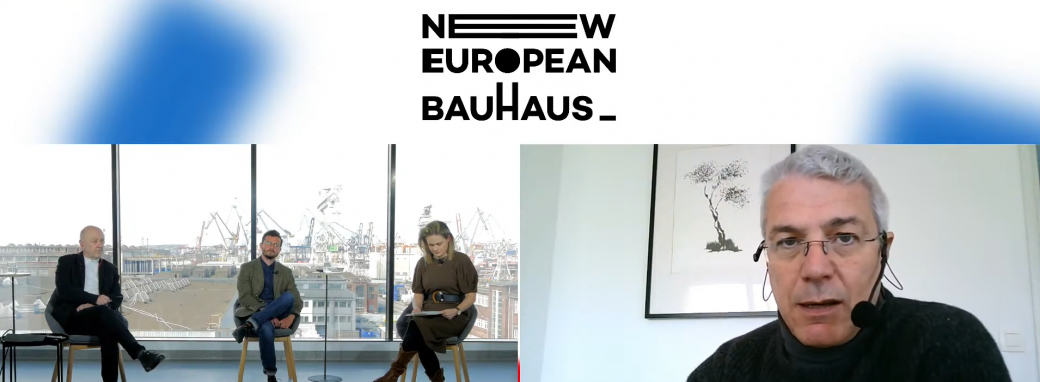We are after the first meeting on the initiative of the European Commission - New European Bauhaus - organized by the Design Center. This is the first step to act in the spirit of new idea, around which the most important European institutions and specialists in the field of design, humanities and economy gather. The goal is to plan a future that is good for us and our planet.

Katarzyna Gruszecka-Spychała: What is it like to live well? What do we need for a good life? What are the elements of a good life? Does beauty belong to it, or maybe other, hard factors are more important? Or maybe our ambitions are too high? Maybe we have already destroyed so much with unsustainable that we should not be asking how to live well in the city, but how to make it liveable at all.
The first part of the meeting was devoted to the presentations of the guests. Allesandro Rancati discussed the NEB assumptions and talked about the first conference about this initiative. He drew attention to the three basic pillars of the movement, based on the words: beautiful, sustainable, together.
Alessandro Rancati: The New European Bauhaus focuses on living in a sustainable green space. This means thinking about tangible elements such as buildings and how urban spaces connect building with natural space.
Subsequently, Piotr Czyż presented the project to revitalize the marketplace in Oliwa, addressing the issues of the social dimension of architecture and common spaces. On the basis of the conducted research, he showed that well-organized bazaars and market halls are an example of a sustainable initiative, combining economic, social and environmental dimensions.
Piotr Czyż: The word of 2021 should be "inclusiveness" and at the same time "agency". Architecture must introduce a certain socio-economic change. Through design, we are able to change the way people eat, buy or meet.
Jacek Dominiczak's presentation made it possible to look at the discussed topics from a historical and theoretical perspective. The professor, as the author of the Dialogical City Theory, also talked about his research and work for cities. He also asked about the definition of beauty and drew attention to the need to preserve the local specificity of architecture in order to avoid the unification of european urban spaces.
Jacek Dominiczak: It is not enough to follow in the footsteps of the Bauhaus. You have to follow them in the sense of courage, multidisciplinary action, but we need new knowledge.
Paulina Kisiel's statement was devoted to the report "Actions to prevent the effects of climate change" based on research involving the inhabitants of Gdynia. The study indicated what their needs are. As it turned out, the perspective of the inhabitants differs significantly from that of the authorities. The inhabitants expect an immediate effect, while the authorities are focused on long-term action. The scope of the research is consistent with the assumptions of NEB, which indicate accessibility and joint action as one of the greatest values.
Paulina Kisiel: This is an unusual initiative, the design approach of which distinguishes it from others. It is design that is supposed to be the common denominator - not only when it comes to aesthetic aspects, but above all design understood as a process approach to solving problems.
The meeting also included a discussion part. The interview, as expected, did not bring any specific conclusions. The aim of the meeting was to discuss the assumptions of the initiative, to show themes that fit into the scope of considerations and to confront different points of view. The topics entered in the New European Bauhaus will be continued in the activities of the Design Center for this year. During Gdynia Design Days, between 3 and 11 July this year, we will have the opportunity to take part in further discussions with the participation of experts.
The recording of the broadcast of the meeting will be available soon on the YouTube channel of the Design Center with a transcription in Polish and English and with a translation into Polish sign language.
